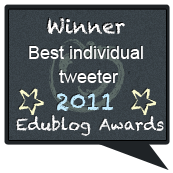I spend a great deal of time looking up stuff. Whether that stuff is blog posts to get a pulse on what is happening in the edusphere or researching new tools to share with teachers, I come across a wide variety of resources that I need to save, catalog and be able to come back to later. Curation is a large part of my day.
But what is curation? Why is it important and how can you do it easily?
I absolutely love this video. The definitions everyone gives for what curation means to them are so totally different yet the same.
The Internet has allowed us to retrieve as much information on any topic from pretty much any source we want. Wading through the junk can be tough. We have to rely on the collective knowledge of our friends and colleagues to help us sort the good from the bad. (Because remember, alone we are smart but together we are brilliant.)
But that is only half of the curation process.
Once we find the good we have to be able to store it and find it again. Having good tools at our disposal is crucial so that the hard work we go through to vet resources doesn't go to waste. These tools also allow us to share our learning and curated resources, adding to the global knowledge.
Curation is an important part of my learning and professional development process. I get a great deal of information from serivces like Twitter and blogs I read. That's the easy part. The more challenging is the filtering of the information and saving it for later so I can find it.
For that I rely on 3 important web tools in my arsenal.
But what is curation? Why is it important and how can you do it easily?
I absolutely love this video. The definitions everyone gives for what curation means to them are so totally different yet the same.
The Internet has allowed us to retrieve as much information on any topic from pretty much any source we want. Wading through the junk can be tough. We have to rely on the collective knowledge of our friends and colleagues to help us sort the good from the bad. (Because remember, alone we are smart but together we are brilliant.)
But that is only half of the curation process.
Once we find the good we have to be able to store it and find it again. Having good tools at our disposal is crucial so that the hard work we go through to vet resources doesn't go to waste. These tools also allow us to share our learning and curated resources, adding to the global knowledge.
Curation is an important part of my learning and professional development process. I get a great deal of information from serivces like Twitter and blogs I read. That's the easy part. The more challenging is the filtering of the information and saving it for later so I can find it.
For that I rely on 3 important web tools in my arsenal.
Evernote-Hands down, my favorite app for organizing. Not only do I have it installed on every computer I have but on my mobile devices as well. With it I can organize everything I am doing into notebooks and notes. On the web I have the Clipper installed so I can snip quotes, references or parts of blog posts that I want to come back to. Best part? All the annotations come with it so it makes the citation later much easier. From my phone I can add to or edit my notes, insert photos or audio. No matter where I am or what I come across I can add it to my notes and notebooks in Evernote.
Pocket-This is another app/program that I have everywhere. Since I do much of my information gathering through things like Twitter I need an easy way to save information without adding to to my master repository. I think of it like a way station. An opportunity to vet the resource before deciding I don't need it or transitioning it to a place for long term storage. With this browser extension I can, with the click of a button mark the site as something to read later. I can search by tag or key word and since I have it installed on my mobile devices I can read my saves when I have a moment or save something to my list when I am out and about.
Diigo-This is another place I save web resources. Again with a browser extension I can take the items I am ready to permanently save and add them to my Diigo list. Oh and I can use the various tools there to annotate and mark up the pages and add any notes. I add tags to organize them and I can share all my saves with a link or two. If you are an educator you get even more perks like the ability to create accounts for your students, sharing lists of sites easily and creating groups so students can share resources.
Curation is becoming increasingly important. Being able to filter information quickly and retrieve the saved information even quicker are skills we all need to develop and help kids develop too. These skills are going to prove very valuable in the future.
What tools do you use to curate information?
What tips or tricks have you developed along the way?
What tools do you use to curate information?
What tips or tricks have you developed along the way?








